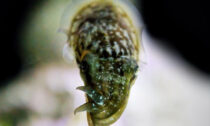
A new study, published in the journal Marine and Coastal Fisheries, has found that the rising amount of ocean heatwaves, triggered by climate change, has a direct effect on the population numbers of the squid species Doryteuthis opalescens which primarily was known to inhabit the warmer waters off Baja California.
According to the study, the population numbers of the species have significantly increased between 1998 and 2019 along the Pacific coast, with Washington seeing a 39-fold increase in squid populations and Oregon recording a 25-fold increase.
By examining fisheries-independent survey data collected by the National Marine Fisheries Service, the researchers were able to develop a spatiotemporal model that shows squid density changes from central California to northern Washington from 1998 to 2019.
“Although our model demonstrated that encounter rates and squid densities for the surveys increased in warmer and more saline waters, large shifts in squid distribution were only associated with deviations in ocean temperatures that could be characterized as marine heatwaves,” the study reads.
The sharp rise in squid populations further north is believed to be directly linked to a series of marine heatwaves, also referred to as ‘the blob’ that was also recorded off Washington numerous times.
It is still unclear whether the population changes are permanent or temporary. Further ecosystem assessment models are needed to forecast the changes, according to Mary Hunsicker, co-author of the new research: “If we can develop models that account for these relationships, we may be able to better predict what these changes mean for species and their predators and the coastal communities that depend on them.”
The study comes after a separate report by the US National Oceanic and Atmospheric Administration (NOAA) last month stated that southeast Alaska is seeing more individuals of the species, also linking the increase to climate change. “It gives credibility to the possibility that they are establishing a population in Southeast Alaska under large-scale sustained warming,” John Eiler, Alaska Fisheries Science Centre biologist, said.












Social Profiles